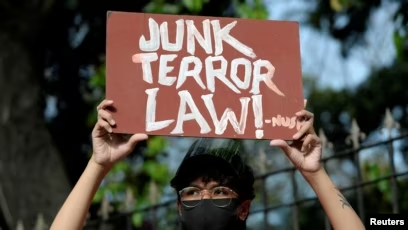The definition of terrorism contemplated in the Anti-Terrorism Bill leaves broad scope for interference with fundamental rights.
Sri Lankan society is built on the rule of law as a cornerstone of peace order and good governance. It follows that all counter-terrorism activities must adhere to the rule of law. Authorities for counterterrorism efforts are defined by laws consistent with the Sri Lankan Constitution. This includes respect for fundamental rights enshrined in the constitution and international obligations such as international human rights and humanitarian law.
Security is also a human right. Terrorism is an attack against those very rights that are fundamental, such as freedom of thought, expression and association, and the right to life and liberty and security of the person.
The definition of terrorism has long been a contentious issue and the broad scope of the definition complicates the matter.
Terrorism is an act of violence which is used to coerce, intimidate or cause fear and is often used as a political tool to achieve an ideological objective. However, the broad scope of the definition as contemplated in the Bill will lead to its use in ways to interfere with the fundamental rights enshrined in the Constitution, in a way to restrict the freedom of speech and expression as well as the right to protest.
Further, the definition contemplated in the Bill shall make it difficult to distinguish between legitimate acts of dissent and actual acts of terrorism. The Government could use the broad definition of terrorism to target and silence dissenters and activists. This not only violates the right to protest peacefully but also the right to free speech which is an inalienable right enshrined in the Constitution.
As prescribed in section 3(2) (f) anyone who interferes with essential services or supplies is considered to be an act of terrorism. This would mean that anyone who takes part in a protest or rally, even if it is peaceful can be deemed to be committing an act of terrorism. This shall lead to the suppression of the people’s right to voice their dissent.
The definition also has a chilling effect on freedom of speech, and freedom of movement. Many people will be afraid to speak out or express their opinion on matters of public interest, for fear of being called a terrorist. This shall result in a climate of fear which is not conducive to a healthy democracy.
The Government is advised to reconsider the definition of terrorism mentioned in section 3 (1) of the Anti-Terrorism Bill and recommend specific amendments to clarify and narrow the acts falling within the definition.
Chairperson
Human Rights Commission of Sri Lanka
06. 04. 202
Press Notice No: HRC/P/E/i/06/04/23
